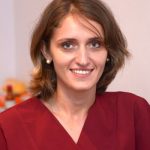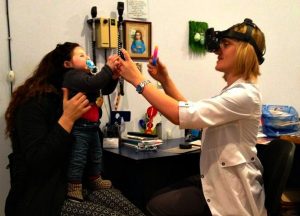YOs across Europe – Diversity and differences in clinical training
 This is the first article on this topic and we encourage YO’s to contribute by sending in their experiences by email to secretariat@soevision.org
This is the first article on this topic and we encourage YO’s to contribute by sending in their experiences by email to secretariat@soevision.org
Lana Datuashvili (attending paediatric ophthalmologist at Clinic LJ, Georgia) describes her training.
Georgia: the country
Georgia is a mountainous country in Southeast Europe, with a subtropical and mostly warm climate throughout the year. The population of my country is about 4 million, and the official language is Georgian. People in Georgia are well known to be hospitable – we have a saying in Georgia that “a guest is a gift from God”!
Ophthalmology training in Georgia
According to the recent data, there are about 300 registered ophthalmologists in Georgia. In order to become an ophthalmologist, you need to first graduate from the medical university, where the courses last six years, then to undertake 4 years of residency training.
Residency training comprises of theoretical as well as practical aspects, including therapies and surgery. Unfortunately, we do not have a specific surgical training curriculum in the country, and for this reason a lot of trainees in Georgia go to various clinics overseas for further experience.
By regulations, we have to take a national exam after residency training in order to obtain a specialist license to work as an ophthalmologist. However, international qualifications like EBO or ICO are not required to practice ophthalmology in Georgia: it is up to one’s personal aspiration to take international exams.
Ophthalmology practice in Georgia
Georgia has the state and private insurance packages, and correspondingly state and privately owned ophthalmic clinics. I personally work in a private clinic in Kutaisi (a city with a population ~180,000) in west Georgia. The department I work in, has six ophthalmologists of diverse profiles.
A typical workday starts at 9:00 in the morning, and ends when the last patient is seen – there is no definite closing time! On average, we see between 80 – 100 patients a day, and we have surgical day scheduled in the week.
We aim constantly to increase our proficiency. To this end, we take various courses in the country and abroad, participating in the conferences to keep ourselves up-to-date and to improve our patients’ care and satisfaction.
What is your interest and what inspired you in the first place?
My interest is ophthalmology in general and the paediatric part in particular.
Why ophthalmology? Not entirely an easy question! I think that vision is the most vital senses among human beings, so much so that I think it is almost equal to life itself!
And why paediatrics? I love working with children! In fact, for me I think it is a bit easier than working with adults. Kids often look with their wide eyes, and if they feel that you have been fair with them, they would cooperate till the very end, providing all the opportunities I need to examine and investigate them thoroughly.
Of course, there is always the rarely occasion when some capricious kids come along. In those cases, I have a few useful tricks to quickly befriend them, which almost guarantee to counteract their behaviour, making the rest of their clinic visit very easy.
Overall, I really like what I do and I love my job!
What are your future aspirations?
I wish to further develop ophthalmology in my country and elsewhere. I would like to form more collaboration with other specialists across the world

